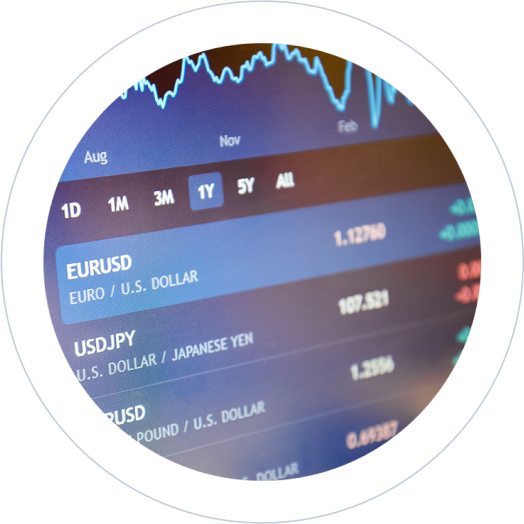What is Currency Pair?
Because forex involves the exchange of two currencies, all FX trading is done in pairs. The base currency is the first currency in a pair, whereas the quote currency or counter currency is the second. EURUSD, for example, is a currency pair that allows you to trade the Euro against the US dollar. The base currency is EUR, which represents for Euro, and the quote currency is USD, which stands for United States Dollar.


Types of Currency Pairs
Currency pairs are divided into three groups based on their characteristics in the market.
- Major currency pairs
- Minor currency pairs and crosses
- Exotic currency pairs

Major Currency Pairs
Currency pairs are divided into three groups based on their characteristics in the market.
| Majors | Currency Pair | Nickname |
|---|---|---|
| EUR/USD | Euro against the US dollar | Euro |
| USD/JPY | US Dollar against the Japanese yen | Gopher |
| GBP/USD | British Pound against the US dollar | Cable or Sterlingd |
| USD/CHF | US Dollar against the Swiss franc | Swissie |
| USD/CAD | US Dollar against the Canadian dollar | Loonie |
| AUD/USD | Australian dollar against the US dollar | Aussie |
| NZD/USD | New Zealand dollar against the US dollar | Kiwi |
Minor/Crosses Currency Pairs
Currency pairs that do not involve the US dollar are called Crosses or minor currency pairs. They are riskier to trade than majors.
| Minors | Currency Pair |
|---|---|
| EUR/GBP | Euro against British Pound |
| EUR/JPY | Euro against Japanese Yen |
| EUR/CHF | Euro against Swiss Franc |
| EUR/CAD | Euro against Canadian Dollar |
| AUD/JPY | Australian Dollar against Japanese Yen |
| AUD/NZD | Australian Dollar against New Zealand Dollar |
| GBP/JPY | British Pound against Japanese Yen |
| NZD/JPY | New Zealand Dollar against Japanese Yen |
| NZD/CHF | New Zealand Dollar against Swiss Franc |
| GBP/AUD | British Pound against Australian Dollar |
Exotics Currency Pairs
Exotics are the group of currency pairs that involve at least one currency from a small country or emerging economy. Exotics associated with higher risk as they are known as susceptible pairs to sudden economic and political changes.
| Exotics | Currency Pair |
|---|---|
| EUR/TRY | Euro against Turkish Lira |
| USD/TRY | US Dollar against Turkish Lira |
| USD/INR | US dollar against the Indian rupee |
| USD/NOK | US Dollar against Norwegian Krone |
| USD/DKK | US Dollar against Danish Krone |
| USD/ZAR | US Dollar against South African Rand |
| USD/THB | US Dollar against Thailand Baht |
| USD/SGD | US Dollar against Singapore Dollar |
| USD/SEK | US Dollar against Swedish Krona |
| USD/MXN | US Dollar against Mexican Peso |
What is CFD?
CFD is short for Contract for Difference and refers to the type of trading instruments obtaining their value from an underlying asset. CFDs are popular speculative tools that allow traders to participate in asset price movements without fully owning the underlying asset.
Types of CFDs
CFDs are categorized into five groups depending on their underlying asset as follows:
- Forex like EUR/USD, GBP/JPY, etc.
- CFDs on commodities like spot metals, gas, and oil.
- CFDs on cryptocurrencies like bitcoin, ethereum, and more.
- CFDs on indices like S&P500, DAX30, and more.
- CFDs on shares like Apple, Microsoft, Tesla, and more.
Why trade CFDs
These exceptional features of CFDs make them very popular for trading:
Access to a huge range of markets
With CFDs trading, you can participate in many different markets
like equities, commodities,
spot metals, cryptocurrencies, and forex on one trading platform
without having to own
physical assets.
Trade on both market directions
CFDs can provide very flexible trading opportunities as they can be
traded on both rising
and falling markets. If you expect the value of an underlying asset
to grow, you can buy a
certain number of CFD on that asset or go long.
Vice versa, if
you
think the asset price
will crash, you can sell its
CFD or go short. So, CFDs give you
an
opportunity to profits in
both directions.
Trade small contract sizes
CFDs trading is possible on a fraction of the underlying asset,
which means you can enter
the market with smaller amounts of money.
So, CFD trading is
cheaper
than trading the
underlying asset while it provides you with the same opportunities
to profit.
Margin trading
You can use leverage when trading CFDs. Leverage increases exposure
on a trade for a certain
amount of capital that can magnify profits.
However, the
leverage
also increases the
trader's risk.
Why Choose Leverage Market?
Leverage Market is an internationally trusted representative. Our features
eases
the trading experience of our
clients.
24/7 Customer support
Our customer support experts are available for you 24x7.
Ease of Transactions
Experience uninterrupted quick deposits & withdrawals.
Safety of Funds
Maximum protection and data security with negative balance protection.
Super- Fast trading execution
Trade with fast execution, low spreads & handy tools.








 Client
Client
 Download
Download
 Branch
Branch
 Clients
Clients
 IB
IB Affiliates
Affiliates MT5
MT5
 Vertex
Vertex WinTrado
WinTrado

 Trading
Trading Trading Account
Trading Account Types of Accounts
Types of Accounts Platform
Platform Knowledge
Knowledge
 Market Analysis
Market Analysis
 Promotion
Promotion Partners
Partners
 Company
Company
 Client
Client